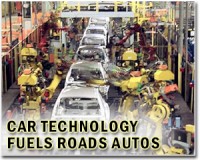 |
Beijing (UPI) Aug 24, 2010 The world's largest traffic jam, stretching up to 62 miles, is now in it's 10th day in Beijing. The massive tie-up has been blamed on road construction aimed at alleviating congestion caused by thousands of trucks transporting coal and perishable goods into Beijing. At the back of the line in Inner Mongolia, trucks were reported to be inching along at 2 miles per day. Stranded motorists -- many who were passing the time playing cards -- have complained about vendors capitalizing on the mega-traffic jam by selling bottled water, instant noodles and other foodstuffs at four times the regular price. Congestion is expected to last for nearly another month, until the roadwork is completed. While Beijing has taken measures to ease traffic, including introducing odd-even number traffic controls and staggered working hours, usual tie-ups on the roads are further compounded by a continual onslaught of newly purchased vehicles. Beijing Mayor Guo Jinlong said the city aims to increase the rate of commuters using public transport to 40 percent this year from 38 percent last year. China, the world's top emitter of greenhouse gases, overtook the United States as the world's largest auto market in terms of vehicles sold in 2009. Beijing had a total of 4.4 million vehicles on the roads during the first half of this year, figures from the municipal commission of transport show. During the same period, the number of vehicles increased by 1,900 per day on average. At that growth rate, the total number of vehicles in the Chinese capital would hit 7 million by 2015, said Guo Jifu, head of the Beijing Transportation Research Center, the state-owned news agency Xinhua reports. Guo Jifu warned Monday that Beijing's road network could only accommodate 6.7 million vehicles. Average driving speeds in Beijing would likely drop to less than 9.3 miles per hour in five years if the number of vehicles continues increasing. Beijing scored the highest on the "commuter pain" index in an IBM Global Commuter survey, which ranks the emotional and economic toll of commuting. A stunning 95 percent of those surveyed in Beijing said that roadway traffic had negatively affected their health, compared with 29 percent of overall respondents around the globe. "Our government should pick up the pace of urban infrastructure construction and spend some of its budget," said Niu Fengrui, director of the Institute for Urban and Environmental Studies at the Chinese Academy of Social Sciences, reports the Global Times.
earlier related report The bus, due to be tested in the coming months in the western part of the city, travels on rails and straddles two lanes of traffic, allowing cars to drive under its passenger compartment, which holds up to 1,400 people. "We're going to start laying down test tracks along a six-kilometre (four-mile) stretch towards the end of the year," Song Youzhou, the chief executive of design firm Shenzhen Hashi Future Parking Equipment, told AFP on Tuesday. "From the second half of 2011, we're planning to test the bus with passengers on board," he said, noting that after a full year of trial runs, authorities would make a decision on whether to use the bus on a wide scale. Song said Hashi was in talks with three Chinese carmakers to produce the eco-friendly bus, which runs on both electricity and solar power. Authorities hope eventually to install 180 kilometres of "straddle bus" lines including a route to the capital's international airport, Song told the official Global Times. Song said the "super bus" could ease traffic congestion by up to 30 percent, as it does not take up actual road space, but special tracks would have to be put down, elevated bus stops built and new traffic signals developed. Only small and medium-sized vehicles will be able to pass under the bus, meaning drivers will have to be extra-vigilant. An alarm would sound if an oversized vehicle attempted to pass, the report said. Song said the bus had to be tested with car drivers in real-time situations to detect any possible problems. According to government data, Beijing is on track to have five million cars on its roads by year's end. The four million mark was passed in December. The head of the Beijing Transportation Research Centre, Guo Jifu, warned this week that traffic in the capital could slow to under 15 kilometres an hour on average if further measures were not taken to limit the number of cars. Private cars are currently kept off Beijing's roads for one day per week depending on licence plate numbers. Beijing's air is among the most polluted in the world, and the problem is getting worse amid high demand for private vehicles from its increasingly affluent residents.
Share This Article With Planet Earth
Related Links Car Technology at SpaceMart.com
 Solution to Beijing's traffic woes? The elevated 'super bus'
Solution to Beijing's traffic woes? The elevated 'super bus'Beijing (AFP) Aug 24, 2010 China's capital Beijing, recently named along with Mexico City as having the worst traffic jams in the world, is looking for solutions. One could be the elevated "super bus". The bus, due to be tested in the coming months in the western part of the city, travels on rails and straddles two lanes of traffic, allowing cars to drive under its passenger compartment, which holds up to 1,400 people ... read more |
|
| The content herein, unless otherwise known to be public domain, are Copyright 1995-2010 - SpaceDaily. AFP and UPI Wire Stories are copyright Agence France-Presse and United Press International. ESA Portal Reports are copyright European Space Agency. All NASA sourced material is public domain. Additional copyrights may apply in whole or part to other bona fide parties. Advertising does not imply endorsement,agreement or approval of any opinions, statements or information provided by SpaceDaily on any Web page published or hosted by SpaceDaily. Privacy Statement |